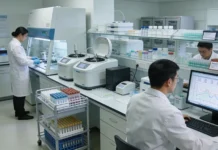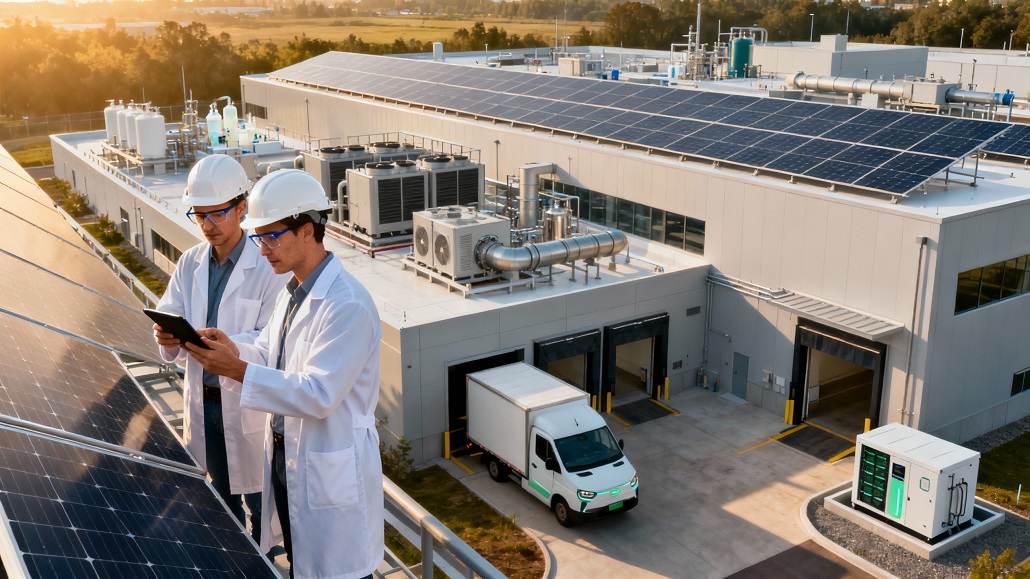In a time when sustainability and environmental consciousness are at the forefront of our global priorities, industries seek greener and cleaner energy solutions. The pharmaceutical sector is a vital community industry responsible for advancing healthcare and improving lives. It drives innovation, develops life-saving drugs, and supports public health worldwide. However, it is also one of the most energy-intensive industries. From research laboratories and manufacturing facilities to packaging and distribution networks, pharmaceutical operations consume vast amounts of energy—much of which still comes from fossil fuels. As global pressure mounts to reduce carbon emissions and transition toward greener operations, solar energy is emerging as a key solution for the pharmaceutical industry’s sustainability journey. As the pharmaceutical industries strive to integrate sustainable practices into their operations, the significance of solar energy cannot be overlooked.
Pharmaceutical laboratories are dynamic environments that demand strict control over temperature, energy reliability, and environmental stability to protect sensitive medications, compounds, and research equipment. To meet these demanding energy requirements more efficiently, many labs are increasingly adopting solar power. Solar energy offers significant cost savings while also delivering environmental and operational benefits that make it an ideal solution for pharmaceutical facilities.
The Energy Demands of the Pharmaceutical Industry
Pharmaceutical manufacturing is complex and highly energy-dependent. Production processes require strict temperature and humidity control, continuous sterilization, refrigeration, and ventilation—all of which consume large amounts of electricity. Laboratories conducting research and development (R&D) rely on high-powered analytical instruments, while cleanrooms and controlled environments demand constant energy to maintain quality and safety standards.
According to industry estimates, energy costs can account for up to 15–20% of total operational expenses in some pharmaceutical facilities. Most of this energy comes from non-renewable sources, contributing to greenhouse gas emissions, climate change, and air pollution. As the global demand for medicines continues to rise, the industry’s energy consumption and carbon footprint are projected to grow unless decisive action is taken.
Why Sustainability Matters for Pharmaceuticals
Sustainability is no longer just a buzzword—it is a business imperative. The pharmaceutical industry is under increasing pressure from governments, investors, and consumers to adopt cleaner, greener practices. Regulatory frameworks such as the EU Green Deal, Science Based Targets initiative (SBTi), and ESG (Environmental, Social, and Governance) reporting standards are pushing companies to measure and reduce their carbon impact.
Beyond compliance, sustainability has become a driver of innovation and competitiveness. Patients and healthcare providers increasingly prefer brands that demonstrate environmental responsibility. Investors are also prioritising companies with robust sustainability strategies, seeing them as less exposed to future risks related to resource scarcity and climate regulation. In this context, adopting solar energy is a tangible and impactful way for pharmaceutical companies to demonstrate environmental leadership.
Benefits of Solar Energy for Pharmaceutical Labs
- Consistent and Reliable Energy Supply
Pharmaceutical laboratories depend on a continuous power supply to support essential equipment, climate control systems, and around-the-clock processes. Even brief power outages can disrupt experiments, damage sensitive materials, and compromise product integrity—resulting in financial losses and potential risks to patient health. By integrating solar energy with battery storage, labs can achieve a stable, dependable power source. This setup minimizes reliance on the grid and provides backup power during outages, ensuring uninterrupted operations and greater energy resilience.
- Lower Operational Costs
Solar energy enables pharmaceutical labs to lower their reliance on costly grid electricity—a major advantage given their substantial power demands. By producing clean energy through installing solar panels, labs can significantly cut monthly utility costs. For facilities that operate 24/7 or run energy-intensive processes, these savings accumulate substantially over time. The reduced energy expenses also allow labs to redirect funds toward critical areas such as research and development, equipment upgrades, and regulatory compliance.
- Reduced Carbon Footprint and Enhanced Sustainability
Sustainability has become a key focus in the pharmaceutical industry as both consumers and regulators demand more environmentally conscious operations. Adopting solar energy allows laboratories to significantly reduce their carbon footprint while supporting global efforts to combat climate change. Since solar power generates no greenhouse gas emissions during operation, it offers a clean and renewable alternative to fossil fuels. By integrating solar energy, pharmaceutical labs can align with international sustainability goals and strengthen their reputation as environmentally responsible leaders in the industry.
- Enhanced Energy Independence and Security
Reliance on the electrical grid exposes pharmaceutical laboratories to risks such as power outages, energy shortages, and fluctuating electricity prices. Integrating solar energy allows these labs to enhance their energy independence and ensure continuous operations, even during grid failures. When paired with energy storage solutions like batteries, solar power also delivers dependable backup capacity during peak demand or outages—boosting the overall resilience and security of laboratory operations.
- Temperature Control and Environmental Stability
Solar power systems can be integrated to directly support HVAC (heating, ventilation, and air conditioning) operations, which are crucial for maintaining stable temperature and humidity levels in laboratory environments. In pharmaceutical facilities, precise climate regulation is vital to preserve product stability and research integrity, as even minor fluctuations can alter chemical compositions or experimental results. By powering HVAC systems with solar energy, facilities can ensure consistent environmental conditions while reducing dependence on the electrical grid.
Overcoming Barriers to Solar Adoption
Although the advantages of solar power are well established, the transition to this renewable energy source presents several challenges. The main hurdles include significant upfront investment costs, limited installation space, and complex regulatory environments in certain regions. Fortunately, these challenges are steadily being addressed through key developments:
- Declining Solar Costs: Over the past decade, the cost of photovoltaic (PV) panels has fallen by more than 80%, positioning solar energy as one of the most cost-effective power sources available.
- Government Support: Tax incentives, subsidies, and net-metering programs in many countries are making solar adoption financially viable for businesses.
- Technological Progress: Next-generation solar panels offer higher efficiency and lower maintenance requirements, while advancements in energy storage enhance system reliability.
- Flexible Financing Options: Innovative models such as power purchase agreements (PPAs) and leasing programs enable organizations to implement solar projects with minimal initial capital outlay.
With these positive trends, solar energy is becoming increasingly attainable for pharmaceutical companies of all scales—from multinational corporations to mid-sized manufacturers.
The Future: A Solar-Powered Pharma Industry
Looking ahead, solar energy will play a central role in the pharmaceutical industry’s decarbonization journey according to MMK Solar. As global health challenges increase, the sector must ensure that the solutions it creates to save lives do not come at the expense of planetary health.
Emerging technologies such as smart grids, AI-driven energy management, and solar-hybrid microgrids will enable pharmaceutical companies to manage power consumption more efficiently and sustainably. Furthermore, integrating solar power with green hydrogen production could pave the way for zero-emission industrial processes in the long term.
By investing in solar energy today, pharmaceutical companies are not just reducing costs—they are safeguarding their future, strengthening resilience, and contributing to a healthier planet for generations to come.
Conclusion
The importance of solar energy in securing a sustainable future for the pharmaceutical industry cannot be overstated. As the world faces escalating environmental and energy challenges, the pharmaceutical sector must lead by example—embracing clean technologies that align human health with environmental stewardship.
Solar power offers a practical, scalable, and impactful solution that reduces carbon emissions, enhances operational resilience, and drives economic efficiency. By harnessing the power of the sun, pharmaceutical companies can ensure that their mission to improve lives extends beyond medicine—to the very ecosystem that sustains life itself.



















